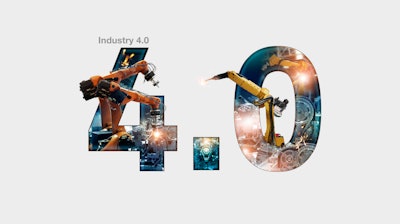
Industry 4.0 is on the horizon. But while the technologies are here, the required skills are not. Technology is outpacing manufacturing employees’ ability to keep up with it.
A recent SYSPRO survey shows that while 38% of businesses upskilled staff to use business systems to their full extent, 61% were not planning to build long-term skills training programs to enable a digital workforce.
So, though manufacturing is being transformed by new technologies, the employees who must work with these advancements are having to play catch-up, because the pace of innovation is advancing faster than employees' skills. Unfortunately, as the survey data shows, upskilling employees to use Industry 4.0 technologies is not a high priority for manufacturers.
It’s a dangerous situation. Industry 4.0 technologies typically require a significant capital investment, as well as a substantial commitment of executive and IT time. If a company's digital transformation journey does not include ongoing skills development and training, along with technologies that will further augment employee development, the Industry 4.0 initiative will very likely fail.
There’s plenty of data supporting the importance of training employees and, more specifically, training them on new technologies. For example, training is critical for recruiting talent from Gen Z. According to Gallup, 59% of this generation say that opportunities to learn and grow are critical considerations when they’re deciding where to apply for a job.
And a lack of training is showing clear signs of increasing risks for companies. Barely more than one-fourth (27%) of IT decision makers said they were satisfied that employees can use new technologies properly, according to a recent survey from CWJobs. Plus, training pays off. A large study from Accenture showed that training provides an ROI of 353%. This echoes the findings of a large study done much earlier by the American Society for Training and Development, which showed training budgets for large public companies predict 50% of their future total shareholder returns.
But it’s also common sense. After all, matter how good the technology may be, it’s of little use if a manufacturers’ people don’t know how to use it properly.
Skills Development: A Key Component of the Digital Transformation Roadmap
Empowering employees to adapt to Industry 4.0 technologies requires a deliberate focus on skills development. It must be central to business strategy to close the significant skills gap.
To build this strategy, management needs to determine the skills required for both the present and future, whether the current workforce possesses them, and whether recruiting efforts are successfully identifying and targeting people who have them. Generally speaking, any company embracing Industry 4.0 needs a workforce with digital fluency, big data analytics, and even knowledge of technologies such as ERP, according to Indeed.com. Additionally, Industry 4.0 will require role changes and even entirely new roles, such as predictive supply network analysts, the smart quality assurance (Q.A.) manager and even the smart factory manager.
Manufacturers need a workforce that’s ready for these changes.
Rollout Ongoing Training Opportunities
Change management and ongoing training should also be included in any digital transformation strategy. Both are vital to ensuring that a manufacturer’s investments in technology are adopted, embraced and maintained.
For example, when updating an ERP system, employees’ first encounter with new features and capabilities shouldn’t be in the normal course of doing their jobs. There should be a change management process that ensures the manufacturer's upgraded, digitally-enabled ERP system is used to its fullest extent so that the business can achieve full value from its investment.
ERP and other technology vendors typically provide extensive digital courses that manufacturers can take advantage of to incorporate into ongoing training programs. In this way, employees can be kept up to date on new processes, capabilities and functionality so that their skills keep pace with technology advancements.
A Skills Assist from Emerging Technology Tools
Thankfully, technology advancements haven’t exclusively increased the skills gap. New technologies such as low-code / no-code tools are emerging that can be employed to close it. With these tools, employees without specialized coding skills can create workflows, applications and point solutions that draw on their specific business and operational expertise. This democratizes software development, eliminating the need to bring in a highly skilled resource for many projects, enabling these highly in-demand employees with coding expertise to focus on more complex, value-added projects.
Technology can also make training, itself, more efficient. According to the World Economic Forum, there’s a lot more to successful education than simply handing an employee the product manual. Successful training programs must have clear educational priorities and sound curriculum design. Educational and training technologies can be employed to monitor and evaluate the outcomes of a training program and then identify how the program can be improved.
The time to start getting serious about technology upskilling is now, because manufacturing cannot afford to wait. A 2021 study conducted by Deloitte and the Manufacturing Institute (MI) predicts that by 2030, the manufacturing sector will have 2.1 million unfilled positions, which will cost the U.S. an estimated $1 trillion in GDP. Industry 4.0 technologies can help mitigate the damage of the coming shortfalls, but only if manufacturing employees possess the skills to use these technologies effectively.
Scott Hebert is the CEO of SYSPRO USA. For more information, visit www.us.syspro.com.






















